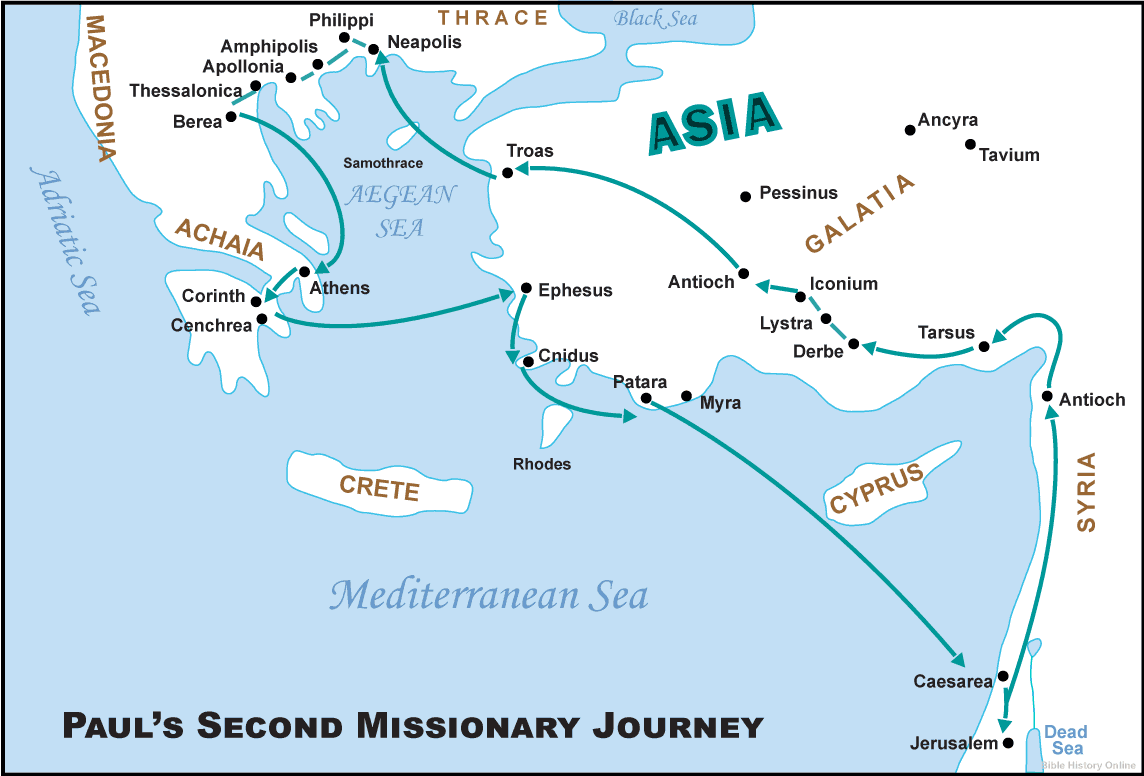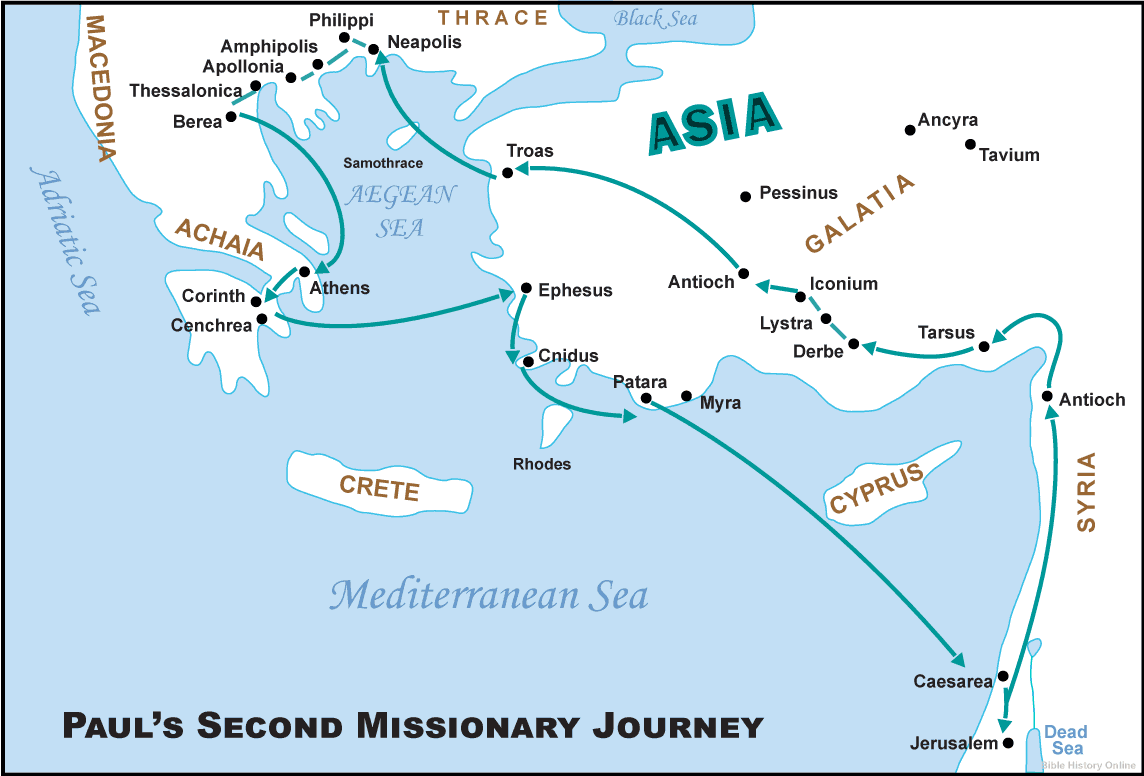Missionaries all over the world send reports back to their respective churches or the person(s) sponsoring them to keep them up to date with the latest news of their missionary work. They may inform them of struggles or ask for money for projects to help local churches.
Missionary journey information
The Bible tells us that Paul made at least three missionary journeys over a period of about 10 years. One thing to keep in mind is that in all of these journeys he walked on rough Roman roads and at times took boats that placed him in grave danger. Though the Romans had pretty much cleared the Mediterranean Sea of pirates, some remained and roamed the area looking for victims to rob and/or kill.
And then there was the weather to consider. During the winter months, travel by boat was treacherous. Back then boat captains sailed as close to the coastline as possible, but in the winter heavy fog prevented safe navigation. Even in the summer months, voyages across the open sea were unpredictable, as storms could suddenly disrupt vessels and sink them. This even happened to Paul when he was being sent to Rome as a prisoner. All prisoners and crew made it safely to shore, however.
Scholars estimate that over the above-mentioned decade of missionary work preaching the gospel of Christ, Paul travelled some 20,000 kilometers (12,428 miles) on foot. To give you an idea of that distance, picture in your mind walking from Los Angeles, California to Manila, Philippines.
Brief history of Paul's first journey
During Paul's first missionary journey, found in Acts chapters 13 and 14, Paul and Barnabas set sail with John Mark as their assistant from around 46 to 48 A.D. Their first stop was Cyprus. Acts 13 records that they made it to Salamis in Cyprus, and preached the word of God in the Synagogues of the Jews. Guests were often allowed to speak after the ceremonies and this is when Paul preached the gospel to the Jews, then, when rejected or kicked to the curb, he went to the Gentiles and preached the good news of the gospel.

Second journey
During the second journey, Paul and Barnabas were in Antioch (modern day Turkey). Some men were preaching that Gentiles had to undergo circumcision to be saved. A spat broke out between Paul and Barnabas which led them to go their separate ways.

Paul’s second missionary journey lasted from about 49 to 52 A.D. and is recorded by Luke in Acts chapters 16-18. It was during this journey that Paul wrote 1st and 2nd Thessalonians, because the church was being persecuted and he wanted to encourage them.
It should be noted that none of Paul’s three journeys were easy or without persecution, but his journey to Jerusalem was nothing but considerable pain and suffering. Around 55 A.D. Paul made his way to Jerusalem where he would be “bound hand and foot" by the Jews and given over to the Gentiles (Acts 21:10). His purpose was to bring money that had been collected by the church in Philippi to help the poor in Jerusalem.
Newsletter
Paul's newsletter is the book of Philippians, written after his third missionary journey. It's a short book of four chapters. He wrote the book from Rome where he was in prison for two years. The Jews had accused Paul of bringing Gentiles into a part of the Temple where Gentiles were not allowed and a riot broke out.

Paul was arrested by the Roman soldiers and bound and beaten. This was not permitted to happen to Roman citizens. After this, they began to question Paul. Knowing the Jews were planning to assassinate Paul, he appealed to Caesar.
By the way, while Paul was in in Ephesus on his third trip (for about 3 years), he wrote 1st and 2nd Corinthians from around 53-55 A.D. to the people of Corinth, a port city full of debauchery (as most port cities are even to this day).
Paul's message to the Philippians
An average reader could read the entire book in 30 minutes or less. Anyway, remember he is in prison at this time. What one might find interesting is the fact that Paul mentions joy or rejoicing 16 times in the letter. Keep in mind he was under constant guard by Roman soldiers. No TV, phones or anything to do, he preached the gospel while in prison.
One oft-misquoted verse
In Philippians 4:13, Paul writes: "I can do all this through him who gives me strength."
I see this verse misquoted so often it is heartbreaking. Many believe that they can accomplish anything simply because they are Christians. This is not true. For example, notice the word strength. If this verse actually meant "all things", as some imply, let's take an example and see if it is true.
Let's say you go to the gym believing you can do anything because of the "strength" God provides us. Now try bench pressing 350 pounds and see what happens. You'd likely be fortunate not to die or at least have your chest caved in!
No, what Paul was saying in this verse was he could either abound or go hungry for the sake of preaching Jesus. In other words, he was able to adjust to any circumstance set before him, whether beatings, imprisonment or assassination attempts. In fact, he rejoiced in these many trials.
Closing
How about you and I? Are we even willing to walk next door to tell others about Christ? If and when we are persecuted, do we whine and cry out or do we rejoice, knowing Christ also suffered, as did all of the apostles? I'll let you to think this over the next time you face any trial in your life.
By the way, the Bible does not tell us how Paul died. But while there is no definitive, historical proof, scholars believe that Paul was likely beheaded by the Romans, under Emperor Nero, either in May or June of 68 A.D. Interestingly enough, Nero died by suicide on June 9th of the very same year.
My friends, let us, like Paul, the greatest missionary in history, be willing to preach the gospel of Christ Jesus, endure hardships, and in all things, be joyful and rejoice.



Nicely done. I don't believe I have or ever will walk that far in my life. Wow.